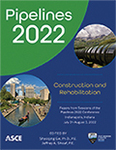Bio-Based Inhibitors to Mitigate Internal Corrosion in Crude Oil Pipelines
Publication: Pipelines 2022
ABSTRACT
According to a US DOT factsheet, about 12% of total pipeline accidents in the past 20 years are caused by internal pipeline corrosion. The internal corrosion in crude oil pipelines is caused by the contaminants and corrosives such as salt water, hydrogen sulfide, carbon dioxide, and bacteria. Film-forming corrosion inhibitors are commonly used in small quantities to mitigate internal corrosion in steel pipelines, which can be expensive, environmentally unfriendly, and partially effective under certain pipeline conditions. The present study aims at utilizing a novel bio-based corrosion inhibitor to mitigate internal corrosion in pipelines. Polyols are sugar alcohols primarily derived from corn starch, which are demonstrated in the past to inhibit chloride-induced corrosion in structural steels through physisorption. In this preliminary study, brine-in-corn oil emulsions containing polyol with weights ranging between 0% and 3% are prepared and dripped on uncoated ASTM A572 steel specimens to assess the corrosion inhibition efficiency of polyols. Significant corrosion protection is achieved by employing polyols in oil emulsions.
Get full access to this article
View all available purchase options and get full access to this chapter.
REFERENCES
ASTM. 2018. ASTM A572/A572M-18 Standard Specification for High-Strength Low-Alloy Columbium-Vanadium Structural Steel. West Conshohocken, PA: ASTM International.
ASTM. 2016. ASTM B117-16 Standard Practice for Operating Salt Spray (Fog) Apparatus. West Conshohocken, PA: ASTM International.
Dwyer, F. P., and D. P. Mellor. 1964. Chelating Agents and Metal Chelates. New York: Academic Press.
El-Hajjaji, F., M. Messali, A. Aljuhani, M. R. Aouad, B. Hammouti, M. E. Belghiti, D. S. Chauhan, and M. A. Quraishi. 2018. “Pyridazinium-based ionic liquids as novel and green corrosion inhibitors of carbon steel in acid medium: Electrochemical and molecular dynamics simulation studies.” Journal of Molecular Liquids 249: 997–1008.
Hodge, J. E., E. C. Nelson, and B. F. Moy. 1963. “Chelates in Agriculture, Metal Chelation by Glucose-Ammonia Derivatives.” Journal of Agricultural and Food Chemistry 11 (2): 126–129.
Koch, G., J. Varney, N. Thompson, O. Moghissi, M. Gould, and J. Paer. 2016. International Measures of Prevention, Application, and Economics of Corrosion Technologies Study. Houston: NACE International.
Mo, S., L. J. Li, H. Q. Luo, and N. B. Li. 2017. “An example of green copper corrosion inhibitors derived from flavor and medicine: Vanillin and isoniazid.” Journal of Molecular Liquids 242: 822–830.
Sajid, H. U., and R. Kiran. 2018. “Influence of corrosion and surface roughness on wettability of ASTM A36 steels.” Journal of Constructional Steel Research 144: 310–326.
Sajid, H. U., R. Kiran, X. Qi, D. S. Bajwa, and D. Battocchi. 2020. “Employing corn derived products to reduce the corrosivity of pavement.” Construction and Building Materials 263: 1–15.
Tamalmani, K., and H. Husin. 2020. “Review on Corrosion Inhibitors for Oil and Gas Corrosion Issues.” Applied Sciences 10 (10): 1–16.
US DOT. 2018. Fact Sheet: Internal Corrosion. 09 24. Accessed 11 19, 2021. https://primis.phmsa.dot.gov/comm/FactSheets/FSInternalCorrosion.htm.
Information & Authors
Information
Published In
History
Published online: Jul 28, 2022
Authors
Metrics & Citations
Metrics
Citations
Download citation
If you have the appropriate software installed, you can download article citation data to the citation manager of your choice. Simply select your manager software from the list below and click Download.
